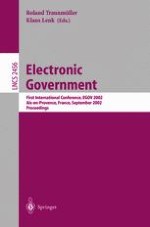In defining the state of the art of E-Government, EGOV 2002 was aimed at breaking new ground in the development of innovative solutions in this impor tant field of the emerging Information Society. To promote this aim, the EGOV conference brought together professionals from all over the globe. In order to obtain a rich picture of the state of the art, the subject matter was dealt with in various ways: drawing experiences from case studies, investigating the outcome from projects, and discussing frameworks and guidelines. The large number of contributions and their breadth testify to a particularly vivid discussion, in which many new and fascinating strands are only beginning to emerge. This begs the question where we are heading in the field of E-Government. It is the intention of the introduction provided by the editors to concentrate the wealth of expertise presented into some statements about the future development of E-Government.
